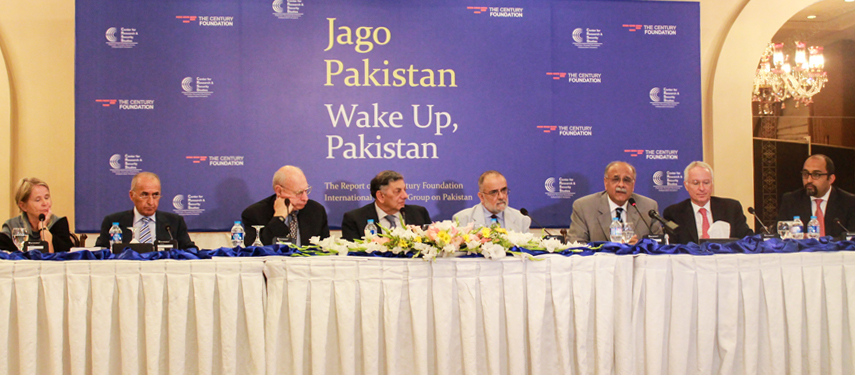Jago Pakistan report provides methods for looking at potential solutions to various socio-economic issues affecting Pakistan, with particular emphasis on education reform and economic stability
Islamabad, May 19, 2015: The Center for Research and Security Studies (CRSS) on Tuesday hosted a panel comprising of members of The Century Foundation (TCF) International Working Group on Pakistan. The panel discussed the recently released report titled “Jago Pakistan” (Wake Up Pakistan), and fielded questions from the audience comprising of foreign delegation representatives, media, academia, intelligentsia and other notable opinion multipliers. The panel consisted of:
- H.E. Thomas Pickering (Former United States Secretary of State for Political Affairs and Chairman International Working Group)
- Former United States Ambassador, H.E. Cameron Munter
- Ambassador H.E. Ann Wilkens (Former Swedish Ambassador to Pakistan and Afghanistan)
- Hikmet Çetin (Former NATO Senior Civilian Representative in Afghanistan, Former Member and Speaker of the Turkish Grand National Assembly and Former Foreign Minister of Turkey)
- Mr. Imtiaz Gul (Executive Director, CRSS)
- Mr. Riaz Khokhar (Former Foreign Secretary and Ambassador of Pakistan)
- Mr. Ahmad Rashid (Prominent author and journalist)
- Mr. Najam Sethi (Editor-in-Chief, The Friday Times)
- Mr. Mosharraf Zaidi (Director, Alif Ailaan campaign)
Ambassador Tom Pickering, the chairman of the Working Group said a country cannot prosper without a great economy and the means to combat emerging challenges. He also spoke at length about the various issues addressed by the report including education, peace and access to justice.
Mr. Ahmad Rashid said that there was a dire need for economic reform for stability, as Pakistan was dead last in the region in terms of tax collection, trade reforms, privatization and exports.
Mr. Hikmat Çetin stressed the importance of education in Pakistan, and iterated that without education reforms, Pakistan cannot hope to progress beyond a certain artificial barrier. Education, he said, is critical for the future of Pakistan.
H.E. Riaz Khokhar said there is hardly any debate in the media about economic analysis, which this report provides, and sheds some light into the role of China as a major player in the region, as well as the respective roles to be played by the civil society and civil-military relationships. He said Pakistan’s most significant problems are internal, we must work to fix our issues within before we address the without.
Ambassador Ann Wilkens spoke about conflict drivers in Pakistan, and coming from an egalitarian society, she finds the biggest divider in Pakistan to be economic inequality. She also stressed the denial of education for children as a major long-term conflict driver.
Mr. Najam Sethi said he was deeply concerned about violent extremism and national security issues in Pakistan, but he felt hope in that Pakistan was finally cognizant of the problems that it faces. “Whether this is a flash in the pan, remains to be seen,” he said. “But the fact that Pakistan is aware of it, such as in the NAP document, is a major step forward.”
H. E. Cameron Munter said that improving bilateral dialogue between Pakistan and India is not the only method to tackle the issues the two countries face. He said that no issue has a single solution, and that all avenues must be explored and exhausted in the pursuit of peace in the region.
Mr. Mosharraf Zaidi led the Q&A panel, fielding questions and addressing several of the queries directly. He said that this report was not a bunch of foreigners talking down at Pakistan, but that nearly half of the Working Group comprised of Pakistanis, and the others included notables from the United States, Japan, Turkey, and Sweden, among others. These people, he said, had Pakistan’s best interests at heart. He ended the panel by thanking the organizers at both TCF and CRSS, and the attendees.
The Jago Pakistan report stands out because instead of just providing hard recommendations and suggesting solutions, it provides frameworks for looking at the problems and methods for formulating solutions. The report was formally launched in Washington D.C. on May 14, 2015.

